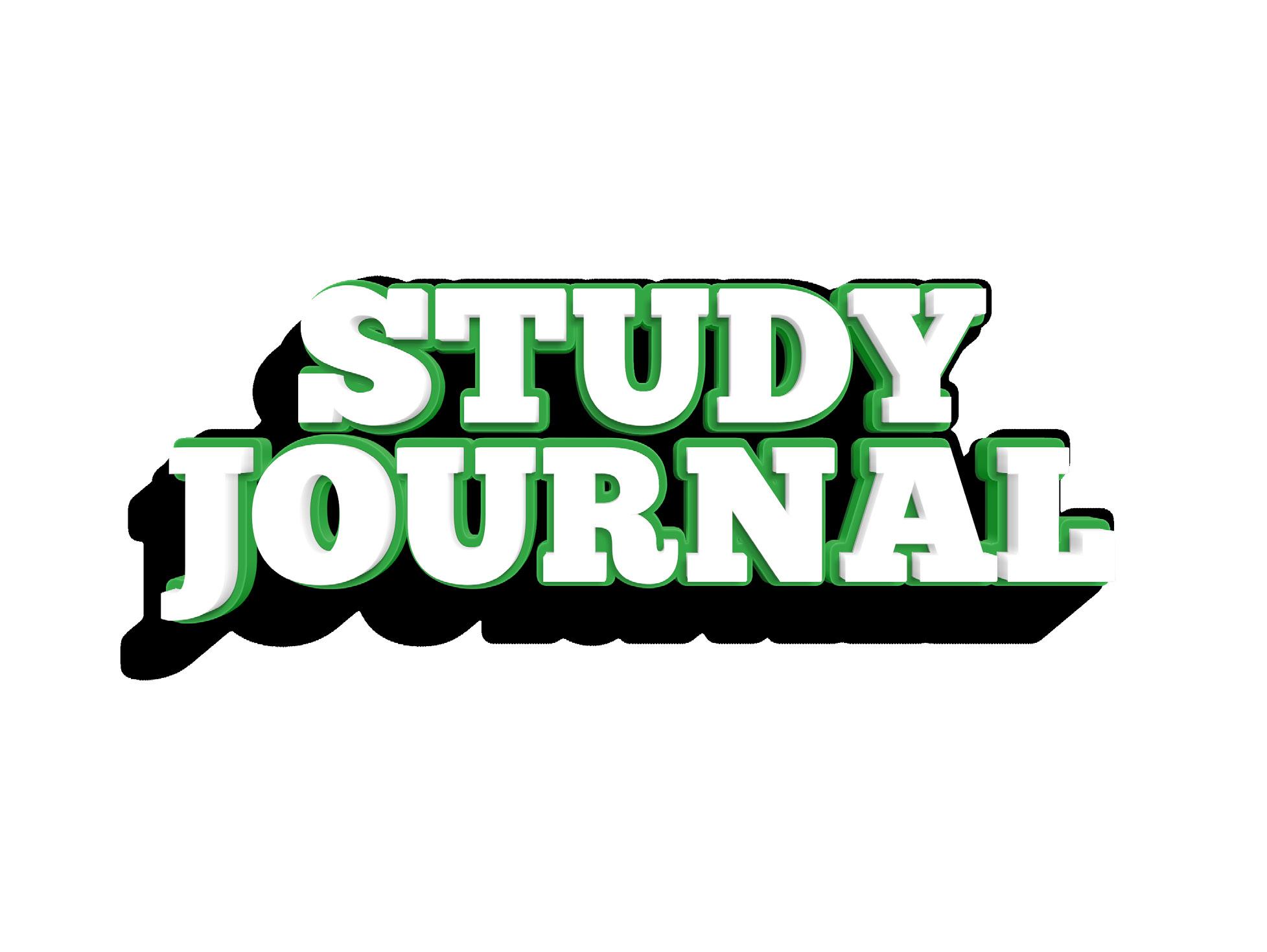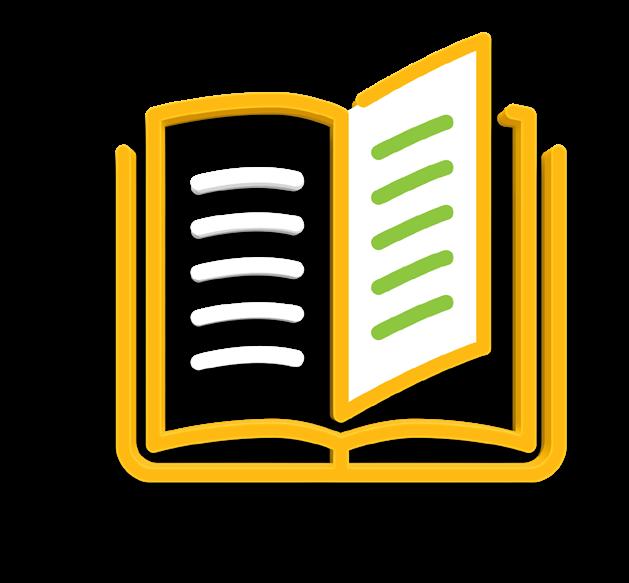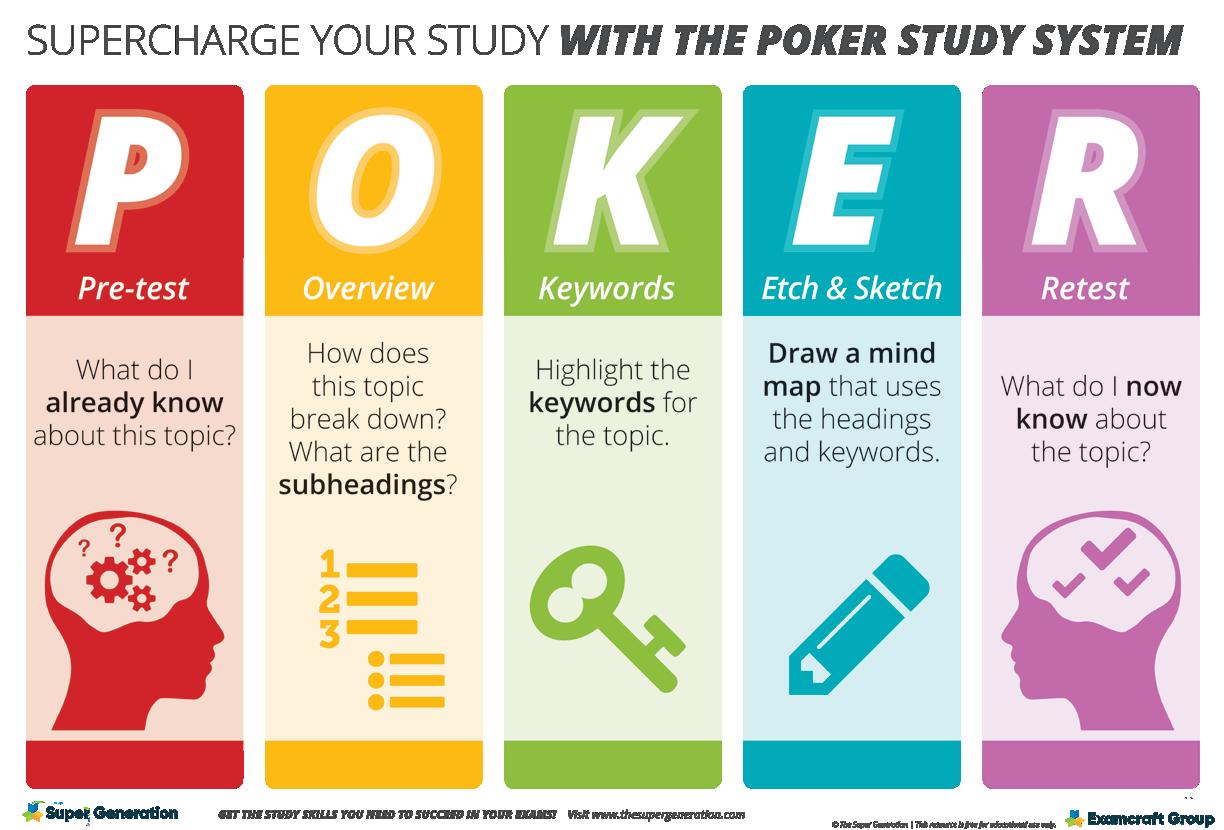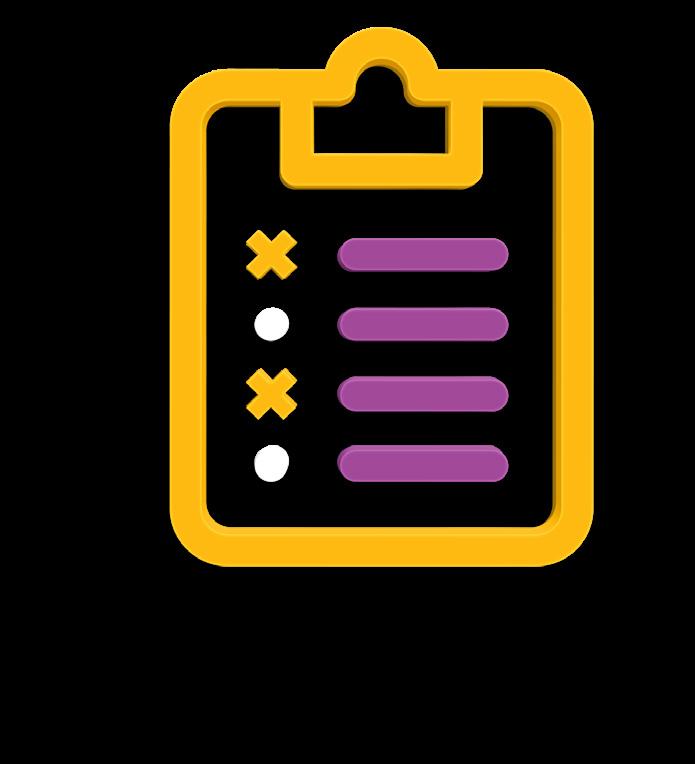WORKBOOK
Practical exercises

WORKBOOK
Practical exercises
POKER Proven and e ective note making system
METHODOLOGY theory and practice

STUDY PLANNER designed to help students increase their productivity



Rate your ability to study BEFORE the seminar
1exercise
Rate your ability to study AFTER the seminar
Challenges
What are the challenges facing you? Possible solutions
2exercise
exercise
This exercise will help you determine the type of mindset you are inclined to have. Read through the following statements and indicate to what extent you would agree or disagree.
Which mindset do you have?
1. You have a certain amount of intelligence, and you can’t really do much to change it.
Agree Maybe Disagree
2. No matter who you are, you can significantly change your intelligence level.
Agree Maybe Disagree
3. You can learn new things but you can’t change your underlying level of intelligence.
Agree Maybe Disagree
4. Learning new things can increase your underlying intelligence.
Agree Maybe Disagree
5. Talent is something you’re born with, not something you can develop.
Agree Maybe Disagree
6. If you practise something for long enough, you can develop a talent for it.
Agree Maybe Disagree
7. People who are good at a particular skill were born with a higher level of natural ability.
Agree Maybe Disagree
8. People who are good at a particular skill have spent a lot of time practising that skill, regardless of natural ability.
Agree Maybe Disagree
9. You can always substantially change how much talent you have.
Agree Maybe Disagree
10. You can learn new things, but you can’t really change your basic level of talent.
Agree Maybe Disagree
Read your text again and pick out the keywords you need to remember. Keywords
OverviewKeywords
& Sketch
SUPERCHARGE YOUR STUDY WITH THE POKER STUDY SYSTEM

Draw a mind map that uses the headings and keywords.
OverviewKeywords Etch & Sketch Retest
the headings and keywords.
Draw a mind map/one-page summary that uses the headings and keywords.
What do I now know about the topic?
What do I now know about the topic?
How does this topic break down? GET THE STUDY SKILLS YOU NEED TO SUCCEED IN YOUR EXAMS! Visit www.thesupergeneration.com © The Super Generation This resource is free for Overview SAMPLE
Coronary arteries = blood to heart muscles Need constant nutrients + oxygen Artery blocked i.e. blood clots muscles short oxygen Stop beating = cardiac arrest Blockage = coronary heart disease (CHD)
Ventricles Bottom Pump blood body Thicker muscles Left ventricle more thick = aorta body Right ventricle less pressure = pulmonary artery lungs
Factors increasing risks

Smoking Diet Obesity Stress Genes
Valves Heart beats contracts squeezing blood out Relaxes blood into atria + ventricles One-way valves stop blood ventricles to atria Between left atrium + ventricle and right atrium + ventricle Heart Beat 60 -70 times/minute Measure pulse rate Pulse expansion + relaxation artery Pulse = heart rate Wrist or neck tendons Exercise faster heart rate more oxygen needed muscles
Pump blood
Cardiac muscles contracts relaxes
Structures 4 Chambers upper atria lower ventricles separated septum Atria
top Left from lungs pulmonary veins
Right from body venae Cavae
Atria to ventricles then out cardiac muscle contracts squeezes out



Some students feel they need to know every little detail of every section of every subject to be really prepared for the exams. This is not so!
Ploughing through piles and piles of books and notes is not an efficient use of study time. Instead, your past papers should become your best friend. You should be totally familiar with the structure and layout of each paper.
Studying is what you do to help you remember and prepare for assessments.
When you decide to sit down and study, you will need the most effective tools to organise and recall information for the exams. In the next few pages we have provided a step-by-step guide for studying using the best tools.
It is important that you identify which topics you need to study in each subject.
Organise your notes for each topic using the ‘POKER’ study system.
Once you have followed the POKER system, file your new one-page summaries or mind maps for each topic in an organised folder. You may have an individual folder for each subject or alternatively a larger folder with subdividers for each subject.
POKER is a simple 5-step methodology which you can use to create notes on any topic you wish to study.

There
(In the workbook section, you will be brought through a worked example for the Heart, from Junior Cycle Heart)
Your first task is to focus your mind on what you are about to study by quickly finding out how much you already know about the topic. Simply take a piece of paper and write down everything you think you know about the topic, do not worry about whether it is right or wrong or even in the correct order at this stage.
Overview
Go to your book and class notes you already have for this topic, and pick out the main headings. They may be divided into different subtitles and subheadings. Take note of them all, so you have a good idea of how this topic is divided up. You are giving your brain a structure to what you are trying to learn.
Keywords
This is where you select all the relevant and important keywords using a highlighter. Don’t just read it, actively read it! Pick out the good stuff and leave the rest behind! The important thing is that you are highlighting the words important to understanding this topic. For example, words such as ‘was’, ‘so’ or ‘about’ are not as important, you don’t need to learn them.
Once you have your keywords, it’s time to put them into note form. Notes can be recorded in many different ways. Colour and images help us to remember notes. For example, creating a mind map will help you retain a lot more information. It is easier for your brain to remember information when it is in the form of a mind map.
Retest
When your mind map is complete, memorise the key points from it. Then retest yourself on this mind map to see if you know it. If you’re having trouble memorising the key points, why not try a memory technique like the example given below?
Now that you have created your notes in the form of a one-page summary, you have this knowledge of the topic in your short-term memory.
BUT it won’t be there forever, it’s up to you to review it and make sure the knowledge goes into your long-term memory.
Why do we find it so easy to remember things like our parents’ names or our phone number?
The reason is because we use them so often that they are implanted in our long-term memory. Wouldn’t it be great if what we needed to know for the exam was that easy to remember?
When you learn something new in class, you may forget about 50% of it by the time you go home. This forgetfulness is normal but highlights the importance of regular review.
The chart shows how your recall (memory) diminishes over time and how regular review enhances recall.
Without review you are lucky to remember 10% of what you have learned after the first three months. This explains why many people get poor results in their exams or can’t remember the name of a person after meeting them just once. However, if you review the material on a regular basis, you dramatically increase your recall (memory).

